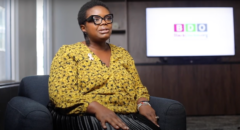collaborating with community partners, we design and build outreach and engagement activations to break down barriers e.g. the lack of awareness about trials, mistrust of research, and logistical obstacles that prevent equitable access across sub-groups.
Digital solutions like decentralized trials, which allow patients to participate remotely, enhance access for some. However, equitable outreach must also bridge digital literacy gaps and use omnichannel tactics pairing high-tech with high-touch, participatory community engagement that establishes and sustains trust.
Related: 6 Myths About Clinical Trials That Are Keeping Us Out of Them
In modern settings, clinical trials can become as accessible as walking into your local retail pharmacy. Pharmacists are being trained to have clinical trial conversations with consumers and provide real-world evidence on safety and effectiveness reflective of America’s diversity. Then doctors can prescribe treatments to all patients with greater confidence and patients can formulate their perspective of relevance about clinical trials.
My life’s work has shown me health equity is integral for people to live joyful, whole lives achieved through optimal wellness. I want to inspire communities disproportionately impacted by illness to envision better health is possible for them through clinical trial participation advancing medical progress. Representation in research leads to reducing disparities in care. It takes all of us working together across healthcare, industry, academia, and community to achieve health equity. But when we succeed, it unleashes the potential and promise for people to thrive.
Kendal K. Whitlock is the Head of Digital Optimization, RWE Clinical Trials, with Walgreens. This role leverages data assets and partnerships to advance culturally responsive approaches to clinical research. In her role, Ms. Whitlock focuses on digital, educational, and community-based solutions to drive access to clinical trials, enabling opportunities that are flexible and convenient for participants.







